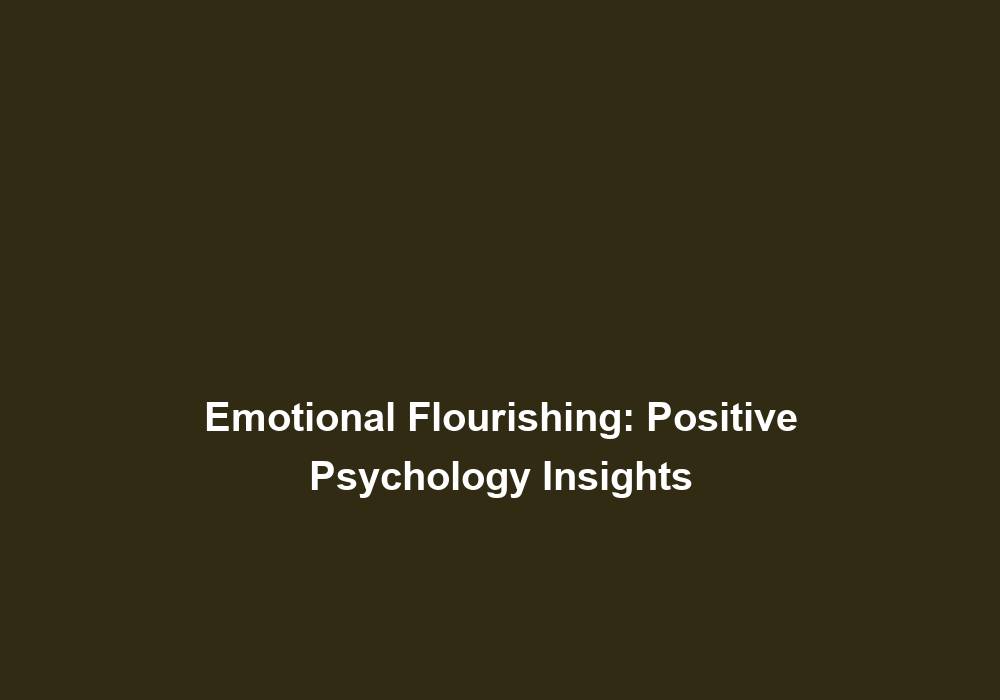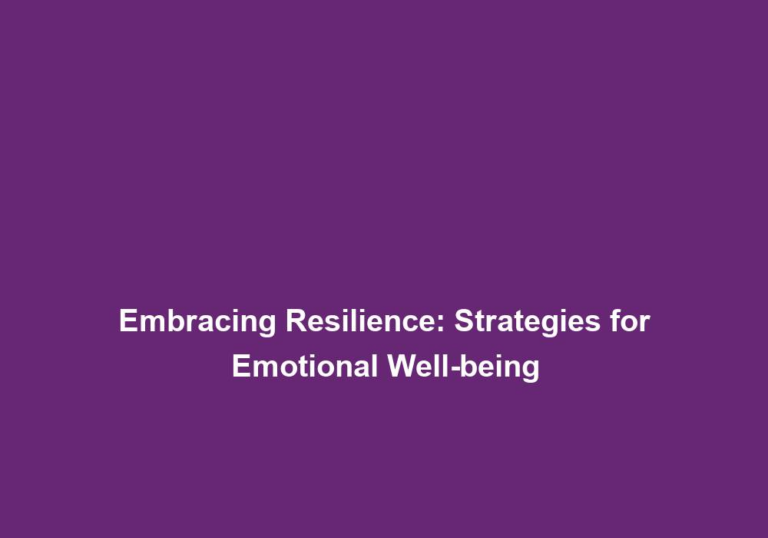Emotional Flourishing: Positive Psychology Insights
Emotional flourishing refers to the experience of positive emotions, high levels of life satisfaction, and overall well-being. It is a state in which individuals thrive and experience a sense of fulfillment in various aspects of their lives. Positive psychology, a field of study that focuses on understanding and promoting human flourishing, offers valuable insights into the factors that contribute to emotional well-being. In this article, we will explore some key concepts and strategies from positive psychology that can help individuals enhance their emotional flourishing.
Understanding Positive Psychology
Positive psychology is a branch of psychology that emphasizes the study of optimal human functioning and the factors that contribute to well-being. While traditional psychology often focuses on understanding and treating mental health issues, positive psychology shifts the focus towards promoting positive emotions, resilience, and personal growth.
Positive psychologists believe that individuals have the capacity to cultivate positive emotions, engage in meaningful activities, and develop strengths that can enhance their overall well-being. By studying individuals who thrive and lead fulfilling lives, positive psychology aims to identify the factors and strategies that contribute to emotional flourishing.
The Power of Positive Emotions
Positive emotions play a crucial role in emotional flourishing. Studies have shown that experiencing positive emotions, such as joy, gratitude, and contentment, not only feels good in the moment but also has long-lasting benefits for overall well-being. Positive emotions broaden our awareness and help us build personal resources that can contribute to our resilience and psychological growth.
To cultivate positive emotions, individuals can engage in various activities. Some effective strategies include practicing gratitude, savoring positive experiences, and engaging in acts of kindness. Research has shown that regularly expressing gratitude, for example, can increase feelings of happiness and life satisfaction. Similarly, savoring positive experiences by fully immersing ourselves in the moment and being mindful of the positive emotions can enhance our overall well-being.
The Importance of Positive Relationships
Positive relationships are another essential factor for emotional flourishing. Humans are social beings, and our connections with others have a significant impact on our well-being. Building and nurturing positive relationships can provide us with a sense of belonging, support, and fulfillment.
To foster positive relationships, it is important to invest time and effort in building meaningful connections with others. This can involve actively listening, expressing empathy, and showing appreciation for the people in our lives. Engaging in activities that promote social connections, such as joining clubs or organizations, volunteering, or participating in group activities, can also be beneficial in forming positive relationships.
Discovering Strengths and Pursuing Meaningful Goals
Identifying and utilizing our strengths is another crucial aspect of emotional flourishing. Each individual possesses unique strengths and talents that, when recognized and utilized, can contribute to their overall well-being and personal growth. By understanding and leveraging our strengths, we can experience a sense of competence, accomplishment, and fulfillment.
To discover our strengths, we can engage in activities such as self-reflection, seeking feedback from others, or using assessment tools that identify our core strengths. Once we have a better understanding of our strengths, we can align them with meaningful goals and pursuits. When our goals align with our strengths, we are more likely to experience a sense of purpose, motivation, and satisfaction.
Practicing Mindfulness and Self-Care
Mindfulness and self-care are essential practices for emotional flourishing. Mindfulness involves being fully present in the moment and non-judgmentally aware of our thoughts, feelings, and sensations. By practicing mindfulness, we can cultivate a sense of inner calm, reduce stress, and enhance our overall well-being.
Self-care involves taking intentional actions to prioritize our physical, emotional, and mental well-being. This can include activities such as regular exercise, getting enough sleep, engaging in hobbies, and setting boundaries to protect our time and energy. By prioritizing self-care, we can replenish our resources, reduce burnout, and enhance our emotional flourishing.
Conclusion
Emotional flourishing is a state of well-being characterized by positive emotions, life satisfaction, and personal growth. By understanding and applying principles from positive psychology, individuals can enhance their emotional flourishing and lead more fulfilling lives. Cultivating positive emotions, building positive relationships, discovering strengths, practicing mindfulness, and prioritizing self-care are all strategies that can contribute to emotional well-being. By incorporating these practices into our daily lives, we can foster emotional flourishing and experience greater happiness and fulfillment.







